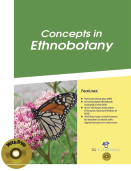Agriculture and Life Sciences

Ethno refers to people, culture, a culture’s collective body of beliefs, aesthetic, language, knowledge, and practice. Botany is the study of plants—from the tiniest fern or blade of grass to the tallest or oldest tree. Ethnobotany is considered a branch of ethnobiology, the study of past and present interrelationships between human cultures and the plants, animals, and other organisms in their environment. Like its parent eld, ethnobotany makes apparent the connection between human cultural practices and the sub-disciplines of biology. Ethnobotanical studies range across space and time, from archaeological investigations of the role of plants in ancient civilizations to the bioengineering of new crops. Furthermore, ethnobotany is not limited to nonindustrialized or nonurbanized societies. In fact, co-adaptation of plants and human cultures has changed—and perhaps intensi ed—in the context of urbanization and globalization in the twentieth and twenty-first centuries. Ethnobotanical knowledge encompasses both wild and domesticated species, and is rooted in observation, relationship, needs, and traditional ways of knowing. Such knowledge evolves over time, and is therefore always changing and adding new discoveries, ingenuity and methods.